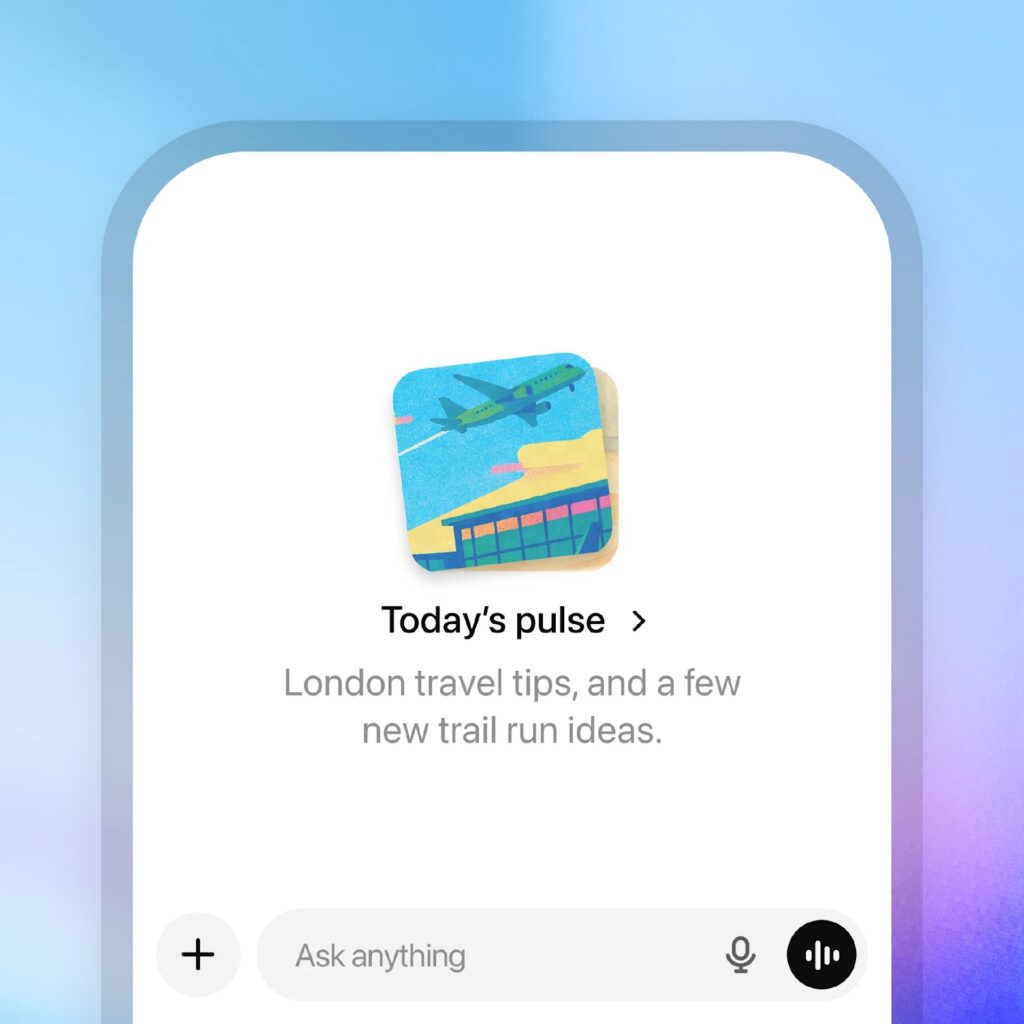- Регистрация
- 17 Февраль 2018
- Сообщения
- 38 917
- Лучшие ответы
- 0
- Реакции
- 0
- Баллы
- 2 093
Offline
New mobile chatbot feature analyzes conversations overnight.


Credit: OpenAI
On Thursday, OpenAI announced ChatGPT Pulse, a new "push" feature that generates personalized daily updates for users without having to ask each time. The preview feature, available now for Pro subscribers on mobile, marks OpenAI's latest attempt to make ChatGPT proactive rather than reactive, with the AI model conducting overnight research to deliver morning updates based on user history and connected apps. OpenAI calls it "personalized research and timely updates that appear regularly to keep you informed."
ChatGPT Pulse works by analyzing a user's chat history, saved preferences, and optional connections to Gmail and Google Calendar each night. The next morning, users receive visual "cards" (small illustrated squares with topic summaries that can be expanded for detail) containing updates on topics the model determines are relevant, such as project follow-ups, dinner suggestions, or travel recommendations. Users can provide feedback through thumbs up or down ratings and request specific topics through a "curate" button.
OpenAI says that rather than waiting for users to initiate conversations, ChatGPT now attempts to deliver information preemptively using what OpenAI calls "asynchronous research," essentially having the model generate queries and responses overnight using traditional methods. Updates appear once daily and disappear after 24 hours unless users save them or ask follow-up questions, which converts them into standard chat conversations.

An example of the ChatGPT Pulse interface provided by OpenAI. Credit: OpenAI
Users can also connect Gmail and Google Calendar to provide additional context for what OpenAI calls more relevant suggestions. When Calendar is connected, ChatGPT might draft a sample meeting agenda, remind users to buy a birthday gift, or surface restaurant recommendations for an upcoming trip. These integrations are off by default and can be toggled in settings.
But like most modern AI products based on large language models, which draw from patterns absorbed through training datasets, there's a catch: Its success rate is highly variable based on the topic at hand. OpenAI says it tested the new Pulse feature with college students through its ChatGPT Lab program, finding that users "started to feel its utility once they started telling ChatGPT what they wanted to see."
The company acknowledges that Pulse "won't always get things right" and may suggest tips for completed projects or miss relevant topics entirely.
OpenAI’s move toward proactive assistants
Pulse follows OpenAI's January introduction of Tasks, a feature that lets Plus and Pro subscribers schedule ChatGPT to perform specific actions at set times. While Tasks requires users to explicitly tell ChatGPT what to do and when (such as sending reminders or generating responses on a schedule), Pulse takes the next step by having ChatGPT choose what information to research and present.
Both features reflect OpenAI's broader marketing push toward what the industry calls "agentic AI," where models operate autonomously within defined boundaries rather than simply interactively responding to prompts. OpenAI, Google, and Anthropic have previously released agentic features that conduct detailed research and deliver reports to users in the background when they are complete.
Along those lines, OpenAI describes Pulse as "the first step toward a new paradigm for interacting with AI" and says future versions will connect to additional apps and deliver updates throughout the day rather than once each morning. The company envisions AI systems that can "research, plan, and take helpful actions" based on user direction, though the current version remains limited to information delivery.
Of course, it's unclear how useful Pulse will be. OpenAI has experimented with many ChatGPT features over the years, some of which become essential and some fall by the wayside. We have not tried Pulse ourselves yet but will likely report back on that topic in the future.
The feature currently works only on mobile devices for Pro tier subscribers, who pay $200 per month for access to OpenAI's most capable models. OpenAI plans to expand Pulse to Plus subscribers (who pay $20 monthly) after gathering feedback from the initial release, with an eventual goal of making it available to free users.


Credit: OpenAI
On Thursday, OpenAI announced ChatGPT Pulse, a new "push" feature that generates personalized daily updates for users without having to ask each time. The preview feature, available now for Pro subscribers on mobile, marks OpenAI's latest attempt to make ChatGPT proactive rather than reactive, with the AI model conducting overnight research to deliver morning updates based on user history and connected apps. OpenAI calls it "personalized research and timely updates that appear regularly to keep you informed."
ChatGPT Pulse works by analyzing a user's chat history, saved preferences, and optional connections to Gmail and Google Calendar each night. The next morning, users receive visual "cards" (small illustrated squares with topic summaries that can be expanded for detail) containing updates on topics the model determines are relevant, such as project follow-ups, dinner suggestions, or travel recommendations. Users can provide feedback through thumbs up or down ratings and request specific topics through a "curate" button.
OpenAI says that rather than waiting for users to initiate conversations, ChatGPT now attempts to deliver information preemptively using what OpenAI calls "asynchronous research," essentially having the model generate queries and responses overnight using traditional methods. Updates appear once daily and disappear after 24 hours unless users save them or ask follow-up questions, which converts them into standard chat conversations.

An example of the ChatGPT Pulse interface provided by OpenAI. Credit: OpenAI
Users can also connect Gmail and Google Calendar to provide additional context for what OpenAI calls more relevant suggestions. When Calendar is connected, ChatGPT might draft a sample meeting agenda, remind users to buy a birthday gift, or surface restaurant recommendations for an upcoming trip. These integrations are off by default and can be toggled in settings.
But like most modern AI products based on large language models, which draw from patterns absorbed through training datasets, there's a catch: Its success rate is highly variable based on the topic at hand. OpenAI says it tested the new Pulse feature with college students through its ChatGPT Lab program, finding that users "started to feel its utility once they started telling ChatGPT what they wanted to see."
The company acknowledges that Pulse "won't always get things right" and may suggest tips for completed projects or miss relevant topics entirely.
OpenAI’s move toward proactive assistants
Pulse follows OpenAI's January introduction of Tasks, a feature that lets Plus and Pro subscribers schedule ChatGPT to perform specific actions at set times. While Tasks requires users to explicitly tell ChatGPT what to do and when (such as sending reminders or generating responses on a schedule), Pulse takes the next step by having ChatGPT choose what information to research and present.
Both features reflect OpenAI's broader marketing push toward what the industry calls "agentic AI," where models operate autonomously within defined boundaries rather than simply interactively responding to prompts. OpenAI, Google, and Anthropic have previously released agentic features that conduct detailed research and deliver reports to users in the background when they are complete.
Along those lines, OpenAI describes Pulse as "the first step toward a new paradigm for interacting with AI" and says future versions will connect to additional apps and deliver updates throughout the day rather than once each morning. The company envisions AI systems that can "research, plan, and take helpful actions" based on user direction, though the current version remains limited to information delivery.
Of course, it's unclear how useful Pulse will be. OpenAI has experimented with many ChatGPT features over the years, some of which become essential and some fall by the wayside. We have not tried Pulse ourselves yet but will likely report back on that topic in the future.
The feature currently works only on mobile devices for Pro tier subscribers, who pay $200 per month for access to OpenAI's most capable models. OpenAI plans to expand Pulse to Plus subscribers (who pay $20 monthly) after gathering feedback from the initial release, with an eventual goal of making it available to free users.
